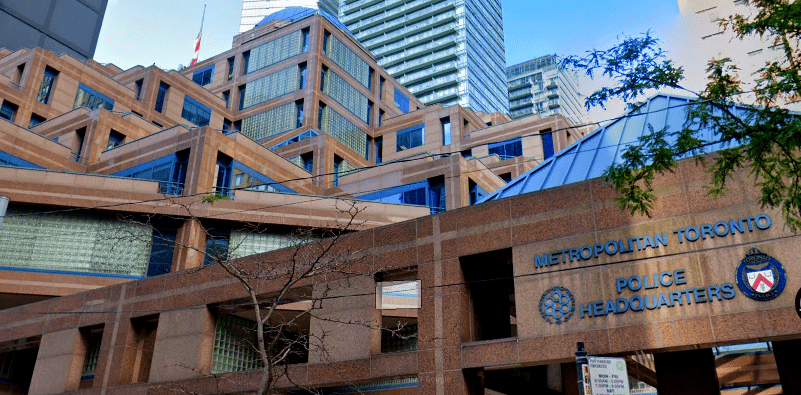Six years after launching an investigation into the negative impacts of disproportionate violence from Toronto Police Services (TPS) against Black communities, the Ontario Human Rights Commission has released its final report.
“Transformative change in police practices in Toronto must be informed by community views, experiences and perspectives,” the commission said in the report on anti-Black racism within TPS.
The report details specific policies and procedures of good practice for the Toronto police to add to their ongoing completion of 81 OHRC recommendations for reform. Preliminary reports were published in 2018 and 2020; the final report was released Dec.14.
The recommendations include destroying banks of biometric data and fingerprinting obtained for charges that did not lead to convictions, and purging historical information gathered from street checks and carding (identification checks).
“We deserve a system that works better for us than the way that the current system is working,” said Syrus Marcus Ware, Black Lives Matter –Toronto team member, and award-winning queer Black artist.
He has been advocating for social and police reform in the city for 26 years.
“Policing seems to be a carte blanche opportunity to continue to brutalize our communities, and then every single year, ask for a pay increase,” Ware said, pointing to the $48.3 million TPS budget this year.
Toronto’s 2023 increase to the police budget was a record-breaking investment in over 10 years. On Dec. 19, TPS plans to move forward with a 1.7-per-cent increase to its 2024 budget, despite present evidence, Ware added.
According to Toronto police data from 2022, Black people accounted for 31 per cent of strip searches in 2020, despite accounting for less than 10 per cent of Toronto’s population.
A similar number of Black (39 per cent) and white (39 per cent) people were involved in cases of use of force in the same year, yet the population of non-racialized people in Toronto is four times larger than the number of Black people.
“Overall, incidents involving White people had lower uses of force rates, while those involving Black people were higher,” the report concluded.
In the OHRC’s 2018 interim report, Black community members were 20 times more likely to be shot by Toronto Police Services officers than a white person, and accounted for five of the seven reported individuals shot and killed by police between 2013 and 2017.
Sixty-seven per cent of all cases of Toronto police use of force in this time period were performed on unarmed civilians.
“Data collection is a key component of an effective accountability system,” the OHRC said in their December report, providing five new recommendations to bolster the Toronto police’s race-based data collection.
None of the recommendations specify adding LGBTQIA2S+ to the information that TPS have self-reported and analyzed in collaboration with the OHRC, since 2019.
However, the current scope of data reporting is still too narrow, and insufficient for “monitoring and accountability,” especially concerning long-standing issues of systemic racism, racial profiling and discrimination, the report says.
“Race-based data on use of force, especially in relation to strip searches, still disproportionately target(s) trans and non-binary community members,” Ware said.
Storm Jeffers, a doctoral candidate and co-author of the 2021 report, Black Youth and the Criminal Justice System, says evidence of anti-Black discrimination within the TPS gathered over decades, and poor disciplinary action taken against racial bias in the service is the backbone of anti-Black racism within TPS.
“If Toronto Police Services is spending time, money and resources to address anti-Black racism, but data continues to show over-policing and Black community members continue to feel unsafe and violated in their own neighbourhoods, then there’s nothing to celebrate,” Jeffers, a University of Toronto sociology teacher told NCM via email.
Read more:
- Actions speak louder than words: why the Toronto Police apology falls flat
- Disrupting “business as usual”
As of Nov. 1, TPS says it has completed 62 of the OHRC’s 81 recommendations for police reform, according to the service’s implementation dashboard.
The recommendation with the most work still to be done is rebuilding public confidence, where only one third of initiatives are complete.
“Change is required at all levels, and in all parts, of our police service,” TPS Chief Myron Demkiw said in a Dec. 14 press release.
In the past, both the TPS and its board have noted they are “open to the idea of considering the need for a stand-alone policy on racial profiling.” It is this ambiguity that the OHRC says perpetuates poor disciplinary action and accountability against police who use racial profiling.
“The less formal the process, and the less closely decisions are regulated or monitored, the more opportunity there is for… racial bias to come into play,” the OHRC said in its final report.
TPS corporate communications did not answer further questions from New Canadian Media on the service’s commitment to a stand-alone policy to end racial profiling.
Keitlyn (they/them) is a multi-media journalist residing in Scarborough, Ont. They are interested in long-form journalism that highlights the visibility of BIPOC expression. True to millennial form, they are a small business owner, carpenter and freelance photographer. They were interested in NCM as it understands the "big picture." Journalists are dedicated to truth and democracy. Our communities have not always had access to these privileges. NCM is filling in a large gap that North American media has long neglected.



